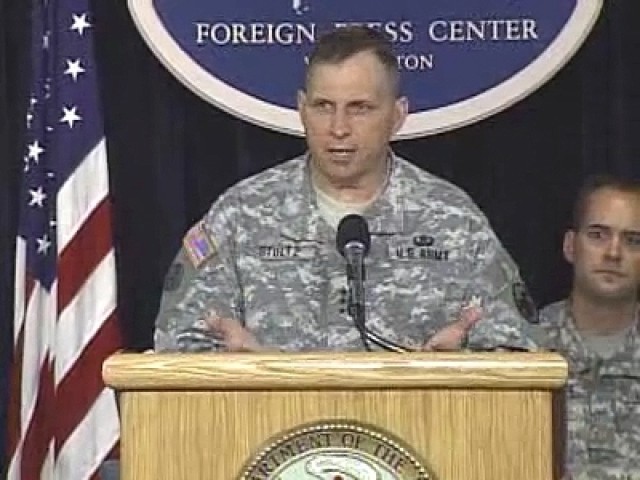WASHINGTON (American Forces Press Service, June 25, 2007) - The Army Reserve has transformed into an operational force, but needs to make more changes to better meet current and future needs, the top Army Reserve commander told reporters at the Foreign Press Center here June 21.
Gone are the days when Reservists committed one weekend per month and two weeks in the summer to soldiering duties, said Lt. Gen. Jack C. Stultz, chief of the U.S. Army Reserve. To respond to increased demands on manpower, he said, the Army Reserve has mobilized nearly 83 percent of its Soldiers. About 170,000 Soldiers have deployed since 9/11.
"With the advent of the war on terror, with Operation Iraqi Freedom and Enduring Freedom, we have now become part of the operational force. ... We have maintained an ongoing commitment to this war," Lt. Gen. Stultz said.
Reserve units are expected to mobilize once every four to five years, the general said. In some cases, units will deploy and support U.S. operations for one year in theater before returning to non-military life.
"And you'll train for another four years until you're expected to get called up again," he said. "And that's the goal of where we're going. To do that, we've got to transform a lot of our units from the legacy structure we had into the new structure that we need."
Lt. Gen. Stultz said Reservists' status as "warrior-citizens" creates an important connection between the deployed warfighters and their American communities back home, which fosters public support for military members.
"Our friends are in the community; our roots are in the community," he said. "And so when we call those citizen Soldiers or warrior citizens up, that community spirit comes with them; that community interest comes with them."
In their civilian lives, Reservists are city planners, fire chiefs, law enforcement officers, police chiefs, waterworks directors, power plant operators, or possess other vital civilian skills that often are lacking in the active military components, Lt. Gen. Stultz said.
While visiting a hospital unit at Camp Bondsteel in Kosovo, the general said, he witnessed a Reservist's civilian skills in action when the Soldier fixed the hospital's malfunctioning magnetic resonance imaging machine.
"And I said, 'What do you do for a living, Sergeant'' And he said, 'I'm an engineer for Toshiba Medical. I do this for a living,'" Lt. Gen. Stultz recalled. "That's the kind of skill sets that you bring."
Lt. Gen. Stultz said a common misconception is that Army Reserve members are deployed only in Iraq and Afghanistan. In reality, he said, Reservists are performing important tasks in 20 to 25 countries around the world, from school-building projects in Panama, to vaccinating goats -- - the country's main food source -- in Djibouti.
"We've got a lot of Reserve Soldiers around the world doing great things, capitalizing on their civilian skills as well as their military skill," he said.
Unexpected deployments can take a toll on Reservists' civilian employers, Lt. Gen. Stultz said, so military officials are working to give notice to employers when Reservist personnel will be called up.
"We're working very hard with the employers of America to talk about providing predictability so that they can predict when that Soldier's going to have to leave and be in the Army, and when he'll be back, and they can make plans around that," he said.
To further relieve employers, Lt. Gen. Stultz said, the Army Reserve is also considering sharing the cost of Reservists' benefits when the Soldiers mobilize.
Despite the Reserve force experiencing high operational tempo and strain, recruitment and retention rates are encouraging, the general said.
"Our re-enlistment rates, our retention, is the highest it's been in years," he said. "So the Soldiers that we're getting into our ranks now feel good about what they're doing, and they want to stay."


Social Sharing